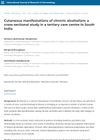 November 2023 in “L'Endocrinologo”
November 2023 in “L'Endocrinologo” Women with PCOS are more likely to experience sexual dysfunction, but lifestyle changes and weight loss can improve sexual function.
 August 2023 in “Revista Contemporânea”
August 2023 in “Revista Contemporânea” Early life factors, including a mother's health and environment, can affect the chances of developing polycystic ovary syndrome later in life.
 August 2023 in “MOJ women's health”
August 2023 in “MOJ women's health” Brown Adipose Tissue (BAT) could potentially treat Polycystic Ovary Syndrome (PCOS) by controlling energy balance and lipid homeostasis, but more human research is needed.
 May 2023 in “IntechOpen eBooks”
May 2023 in “IntechOpen eBooks” More research is needed to understand how testosterone is maintained in adult males.
 May 2023 in “Endocrine, metabolic & immune disorders”
May 2023 in “Endocrine, metabolic & immune disorders” Hibiscus rosa-sinensis is used in traditional medicine and is safe in high doses, with various health benefits.
 February 2023 in “Journal of plant science and phytopathology”
February 2023 in “Journal of plant science and phytopathology” Jatropha dioica may have antiviral, antifungal, and other medicinal properties, but more research is needed.
 January 2023 in “Our Dermatology Online”
January 2023 in “Our Dermatology Online” An old recipe called "Champigny Saumure" might help treat a rare scalp condition.
 January 2023 in “Eurasian journal of science and engineering”
January 2023 in “Eurasian journal of science and engineering” Medicinal plants in Kurdistan have potential health benefits and need more research for drug development.
 January 2023 in “Journal of Cosmetics, Dermatological Sciences and Applications”
January 2023 in “Journal of Cosmetics, Dermatological Sciences and Applications” The hair growth serum Trichosera® was effective in increasing hair regrowth and density and reducing hair fall without significant side effects.
 September 2022 in “Biomedicines”
September 2022 in “Biomedicines” Lipid Accumulation Product and Free Androgens Index are effective for assessing fatty liver disease risk in women with Polycystic Ovary Syndrome.
 May 2022 in “International Journal of Health Sciences (IJHS)”
May 2022 in “International Journal of Health Sciences (IJHS)” Hibiscus Rosa Sinensis Linn is a tropical plant used for various medicinal purposes due to its many beneficial properties and components.
May 2022 in “Indian Journal of Pharmacology” Sodium valproate can cause serious high blood pressure in children.
 January 2022 in “Food Science and Technology”
January 2022 in “Food Science and Technology” The herbal mixture could potentially improve hair loss.
September 2021 in “Assay and drug development technologies” Drug repurposing shows promise for treating many medical conditions.
June 2021 in “International journal of cosmetics and dermatology” Vitamin C and E may help with certain skin and hair conditions, but more research is needed to confirm their effectiveness.
January 2021 in “Annals of translational medicine” YH0618 helped reduce skin and nail problems and fatigue in chemotherapy patients.
 January 2020 in “Journal of Clinical Biochemistry and Nutrition”
January 2020 in “Journal of Clinical Biochemistry and Nutrition” Low zinc levels in chronic liver disease patients are linked to more severe symptoms like taste issues and skin problems, and zinc supplements might help.
 January 2020 in “Journal of Cosmetics, Dermatological Sciences and Applications”
January 2020 in “Journal of Cosmetics, Dermatological Sciences and Applications” TrichoxidilTM could be a promising new treatment for hair loss.
April 2019 in “Journal of the Endocrine Society” An over-the-counter vitamin/mineral supplement improved hair loss and blood sugar control in a woman with non-classic 11-hydroxylase deficiency.
April 2007 in “CRC Press eBooks” Certain vitamins in wrong amounts, alcohol abuse, metals, and other toxins can cause serious brain and nerve damage.
Dr. SKS Hair Booster Serum is safe and effective for reducing hair fall and promoting hair growth.
February 2023 in “Frontiers in Pharmacology” Water extract of Cacumen Platycladi helps hair growth by activating specific cell pathways.
January 2023 in “Pharmaceutics” AA–TF#15 significantly promotes hair regrowth and could be an effective treatment for androgenic alopecia.
January 2023 in “International Journal of Trichology” Alcohol-free minoxidil is better for treating hair loss in Indian men.
October 2022 in “Biomedicines” Finasteride in male rats causes liver and metabolic issues in their offspring.
 January 2022 in “Surgical and Cosmetic Dermatology”
January 2022 in “Surgical and Cosmetic Dermatology” People with androgenic alopecia (AGA) have a higher chance of getting metabolic syndrome.
 May 2021 in “The Journal of clinical and aesthetic dermatology”
May 2021 in “The Journal of clinical and aesthetic dermatology” Most women with hair loss using 5% topical Minoxidil are satisfied with the treatment, but hair loss still affects their daily habits and social life.
 July 2012 in “Hair transplant forum international”
July 2012 in “Hair transplant forum international” Lifestyle choices like stress, smoking, heavy drinking, sun exposure, and chemical hair treatments might speed up hair loss in people with androgenetic alopecia.
 1 citations,
October 2016 in “International Journal of Research in Dermatology”
1 citations,
October 2016 in “International Journal of Research in Dermatology” Chronic alcoholics most commonly experience skin infections.
 December 1920 in “The Lancet”
December 1920 in “The Lancet” The document discusses various public health initiatives and societal issues, emphasizing early intervention and support.



















